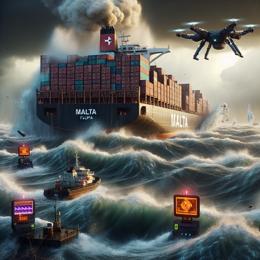Image created by AI
Tensions Escalate in Red Sea as Houthi Attack Causes Environmental and Navigational Peril
In a significant escalation of tensions in the Red Sea region, the United States military has issued a stern warning of an impending "environmental disaster" following an assault by Yemen's Houthi rebels on a cargo vessel. This attack led to an extensive oil slick that now poses a substantial risk to marine life and the surrounding coastal habitats.
On February 18, the United Kingdom-owned, Belize-flagged bulk carrier named Rubymar was subjected to multiple missile strikes by the Houthi forces as it journeyed through the strategic Bab al-Mandeb Strait. The waterway, a vital choke point in global shipping, binds the Red Sea to the Gulf of Aden and is now the scene of an evolving crisis.
Despite the considerable damage from the attack, which forced the crew to evacuate, there were no reported casualties among the ship's personnel. However, the US Central Command (CENTCOM) has confirmed that the crippled vessel is not just adrift but in distress, imperiled by the gradual ingress of sea water.
An oil slick stretching approximately 29 kilometers (18 miles) has resulted from this incident, presenting a stark indicator of the vessel's deteriorating situation. The CENTCOM report ominously noted that the ship carried over 41,000 tonnes of fertilizer, a cargo that if released into the water, could exacerbate the environmental damage.
Adding to the gravity of the situation, the US military has underscored the Houthis' responsibility for the ongoing disruption to critical Red Sea trade routes. The insurgents' apparent willingness to perpetuate the damage induced by their strikes has alarmed international observers. The attacks have been cited as a significant threat to regional ecosystems, livelihoods, and essential imports, including food supplies.
The incident's complexity is further compounded by the challenges posed to rescue and remediation efforts. Citing from US officials, CNN reports that the precarious security condition in the Red Sea hampers attempts to access the Rubymar, let alone salvage it, with the identity of the substances forming the slick still undetermined.
US response to these developments has been swift and substantial. Military action has targeted Houthi-controlled territories within Yemen, taking out sophisticated weaponry poised for further maritime aggression. According to CENTCOM, these "self-defense strikes" have neutralized seven mobile anti-ship cruise missiles, contributing to the safer passage for naval and commercial vessels in the region.
Moreover, earlier this week, the Houthis declared a strike against what they identified as an Israeli cargo ship, the MSC Silver, near the Red Sea’s gateway. They have also purportedly mounted drone assaults on US warships, alongside targets in southern Israel, demonstrating a considerable reach and a clear escalation in aggressive postures.
Additionally, the successful takedown of an MQ-9 attack drone by the Houthis, as acknowledged by US officials, indicates a shift to more advanced methods of combat engagement by the rebel group, including the alleged deployment of "submarine weapons."
The Houthi leadership has been vocal about their advances, with their spokesperson proclaiming an increase in their ranks by over 200,000 fighters since the Gaza war began. Such revelations paint a stark picture of the intensifying Yemen conflict and the potential ripple effects on regional stability and the global shipping industry.










